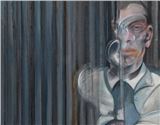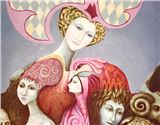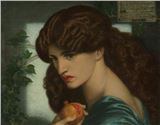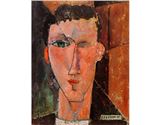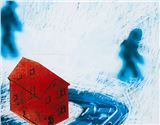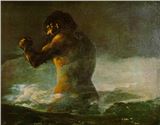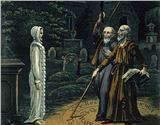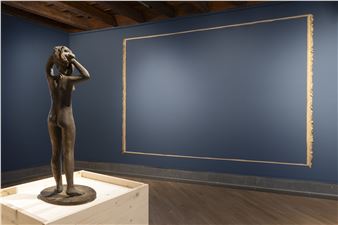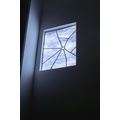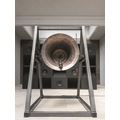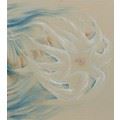World War II: Drama, Symbol, Trauma
In preparing an exhibition about World War II, we had no ambition to chart its history but rather to focus on some threads that have had the greatest impact on the Polish consciousness.
We start off with the Portents of War, a theme with an important message. World War II made us realise to what extent people can turn a deaf ear to forewarnings. This lesson remains topical. The next theme is the Sonderaktion Krakau. Using this codename, on 6 November 1939 the Nazi occupants arrested some 180 professors and lecturers from mainly the Jagiellonian University in Krakow. They were taken to the concentration camp in Sachsenhausen. The Nazis aimed to destroy the intellectual elite and moral beacons in order to facilitate the subjugation of the defeated nation. Anti-Semitic propaganda also played an important part in this ruthless brainwashing. Here the Nazi initiative fell on fertile ground. In the section of the exhibition entitled Anti-Semitism, we show slogans and posters that aimed to fuel anti-Jewish sentiment. The next topic is The Life in the Ghettoes, depicting the most tragic predicament in the time of war, more dramatic even than incarceration in the concentration camp, since it is harder to witness – totally powerless – the suffering of one’s loved ones than being a victim oneself. An important thread in the exhibition is the Warsaw Uprising – a controversial feat of underground resistance, subject to continuing historic and emotional reinterpretation. Without a doubt, the most important and from the ethical point of view topical theme is The Holocaust. This greatest failure of European values is still open to an analysis that would bring an effective forewarning for the future. The final part of the exhibition is The Artist as a Witness to the Drama.

Recommended for you
In preparing an exhibition about World War II, we had no ambition to chart its history but rather to focus on some threads that have had the greatest impact on the Polish consciousness.
We start off with the Portents of War, a theme with an important message. World War II made us realise to what extent people can turn a deaf ear to forewarnings. This lesson remains topical. The next theme is the Sonderaktion Krakau. Using this codename, on 6 November 1939 the Nazi occupants arrested some 180 professors and lecturers from mainly the Jagiellonian University in Krakow. They were taken to the concentration camp in Sachsenhausen. The Nazis aimed to destroy the intellectual elite and moral beacons in order to facilitate the subjugation of the defeated nation. Anti-Semitic propaganda also played an important part in this ruthless brainwashing. Here the Nazi initiative fell on fertile ground. In the section of the exhibition entitled Anti-Semitism, we show slogans and posters that aimed to fuel anti-Jewish sentiment. The next topic is The Life in the Ghettoes, depicting the most tragic predicament in the time of war, more dramatic even than incarceration in the concentration camp, since it is harder to witness – totally powerless – the suffering of one’s loved ones than being a victim oneself. An important thread in the exhibition is the Warsaw Uprising – a controversial feat of underground resistance, subject to continuing historic and emotional reinterpretation. Without a doubt, the most important and from the ethical point of view topical theme is The Holocaust. This greatest failure of European values is still open to an analysis that would bring an effective forewarning for the future. The final part of the exhibition is The Artist as a Witness to the Drama.
Artists on show
- Agata Siwek
- Alina Szapocznikow
- Andrzej Zygadlo
- Artur Zmijewski
- BronisЕ‚aw Wojciech Linke
- Edward Dwurnik
- ElЕјbieta Janicka
- Eugeniusz Haneman
- Ewa Faryaszewska
- Gustaw Zemla
- Jane Korman
- Jonasz Stern
- Józef Szajna
- Klaus Staeck
- Krystyna Piotrowska
- Krzysztof M. Bednarski
- Leon Wroblewski
- LukáЕЎ Houdek
- ЕЃukasz Surowiec
- Marek Oberländer
- Maria Hiszpanska-Neumann
- Maria Jarema
- Mieczyslaw Watorski
- Miroslaw Balka
- Pawel Kowalewski
- Piotr Saul
- Roman Tarkowski
- Ryszard Apte
- Sigalit Landau
- Stefan Mrozewski
- Thomas Lange
- Witold Stelmachniewicz
- Wladislaw Strzeminski
- Wladyslaw Hasior
- Wojciech Fangor
- Zbigniew Grzybowski
- Zbigniew ЕЃagocki
- Zbigniew Libera
- ZdzisЕ‚aw Pabisiak
Contact details


 ARTISTS
ARTISTS
